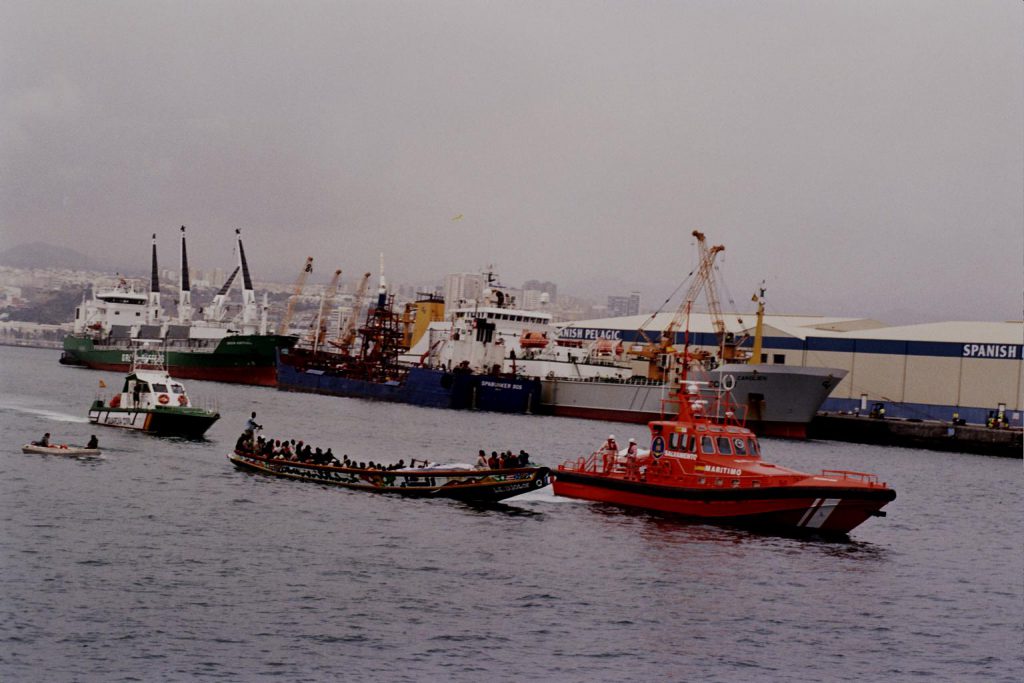There is no doubt that migration in the Canary Islands will be discussed this Friday 20 November during the visit of Spanish Interior Minister Fernando Grande-Marlaska to his Moroccan counterpart Minister Abdelouati Laftit.
Migration flows between the Canary Islands, Morocco and Senegal are at an all-time high, reproducing what happened in 2006 on this route. As of 15 November 2020, the number of people crossing has been multiplied by six, compared to 2019, reaching a total of 16,950 people. An increase in crossings leads to an increase in deaths at sea. In one week at the end of October, 480 people died or were reported missing. On 29 October, 140 people lost their lives off the Senegalese coast.
This rise in departures and the changes in the “traditional” migratory routes now forces migrants and refugees to begin their desperate journey further and further south (with a relative increase in the risk of losing their lives). This is a direct result of the systematic implementation of two policies: the security-based approach to migration and the outsourcing of border management responsibility to non-EU countries.
Indeed, on the northern route towards the European Union, security has been heavily reinforced in the Spanish enclaves of Ceuta and Melilla: new fences of up to 10 metres are being erected and new optic fibre networks aimed at intercepting migrants are being deployed.
The visit by the European Commission, on November 6, to the Canaries mostly strengthened the role of the European Border and Coast Guard Agency (Frontex) as Spain negotiates a renewed agreement with the Agency to prevent the landing of boats on the islands. This comes as Frontex is being accused of violent pushbacks in the Aegean Sea and in the Central Mediterranean, in violation of the principle of non-refoulement.
One just needs to look at the repartition of funds for EU-Morocco migration projects under the EU Emergency Trust Fund for Africa to understand current EU priorities: 80,85% of the funds (i.e. 235 million euros of the Fund) are dedicated to border security management, while only 19,15% are allocated to integration and human rights protection projects.
Non-EU countries bordering the Mediterranean are also increasingly taking returns into their own hands: for instance, since 30 September 2020, Algeria violently pushed back 6,747 people to Niger. Dozens of migrants, including women and minors, were returned by Morocco to Senegal and Guinea in October and November 2020.
Increasing border security and outsourcing border management is not only reserved to Spain and Morocco. In fact, these policies are institutionalised by the EU Pact on Migration and the budget share dedicated to migration in the Multi-Annual Financial Framework.
EuroMed Rights calls for the EU and its Member States to:
- Stop linking the use of development funds for cooperation on border management with non-EU countries to readmission policies;
- Ensure transparency of EU funds for migration-related cooperation projects in Morocco, and put in place an effective monitoring mechanism to ensure compliance with fundamental rights;
- Abandon the principle of “safe country of origin”, which is contrary to the individual assessment of asylum applications. EuroMed Rights also wishes to recall that no country can be considered as safe;
- Increase the number of reception places on the Canary Islands, so that all those who disembark can be accommodated and enjoy their right to be taken care of with dignity and in accordance with fundamental rights, as well as speeding up transfers to the peninsula;
- Set up European search and rescue operations at sea, stop criminalising humanitarian assistance by civil society organisations and human rights defenders, at sea and on land borders.
Photo credit: Sara Prestianni

